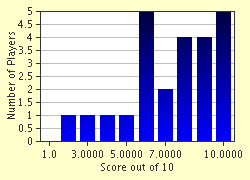Quiz Answer Key and Fun Facts
1. By all appearances, Rudolf Abel is a harmless old man. He rides the subway to the Broad Street station and makes his way towards the riverside, seemingly unaware of the Federal agents who are tailing him. He sets up an easel in front of a park bench and begins to paint. What does Abel do next that confirms his involvement in espionage?
2. James B. Donovan, a respected insurance attorney, is selected by the Brooklyn Bar Committee to defend the accused Soviet spy, so that justice will appear to have been done in the eyes of the world stage. Donovan's wife, Mary, has strong views about her husband taking on the case. What are they?
3. Donovan conducts himself admirably in his defense of Abel, but he runs into roadblocks with the Judge, who treats the outcome of the case as a foregone conclusion. In the eyes of the public, Donovan is viewed as a traitor to his country. After Abel is convicted of all charges, he tells Donovan that he reminds him of a man that he describes as "Stoikey Muzhik". How does Abel translate that phrase for Donovan?
4. Abel is to be sentenced on the 15th of November, and Donovan visits the Judge at home to present the case for not imposing the death penalty. Why does he claim that it is in the best interests of the United States that Abel remain alive?
5. Someone claiming to be Abel's wife writes to Donovan from East Germany, but it is actually an overture from the Soviets. The CIA recruits Donovan to negotiate a prisoner exchange with the Russians. Whose release are they trying to secure?
6. Donovan travels to Berlin with Agent Hoffman, his CIA handler, and quickly discovers that the spy business isn't all that it's cracked up to be. His living conditions are spartan, the Russians may try to pull the old bait-and-switch, and he is left to navigate East Berlin without an escort. What does Donovan lose to a gang of thugs on his way to the Soviet Embassy?
7. Through a series of machinations, Donovan ends up negotiating with the East German Attorney General for the release of Frederic Pryor, the American economics student being held by the Stasi. When the A-G is called away on urgent business, what message does Donovan have his assistant convey to his boss?
8. The Americans and the Russians are all set for the exchange, but Donovan insists on waiting to see if the Germans will release Frederic Pryor at Checkpoint Charlie. An impatient Agent Hoffman tells Abel that he is free to walk across the Glienicke Bridge. What does Abel do next?
9. Throughout the film, Abel remains quietly stoic and virtually unmoved even in the face of grave peril. What is his repeated answer to Donovan when he is asked why he doesn't seem worried by the inherent danger of his circumstances?
10. Donovan makes it home, satisfied with the outcome of his trip but exhausted. He is welcomed by his family, who are shocked to learn of his true exploits from a press conference on TV. What did Donovan tell them was the purpose of his trip?
Source: Author
jmorrow
This quiz was reviewed by FunTrivia editor
skunkee before going online.
Any errors found in FunTrivia content are routinely corrected through our feedback system.

